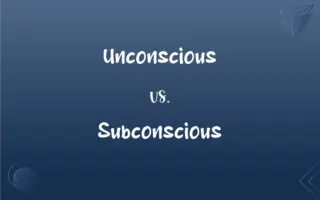Nevertheless vs. However: What's the Difference?
Edited by Aimie Carlson || By Janet White || Published on January 22, 2024
"Nevertheless" is used to express a contrast to what has just been said, often emphasizing perseverance or resilience, while "however" indicates a simple contrast or exception.

Key Differences
"Nevertheless" is typically used to signal a strong contrast, often implying a sense of continuation or persistence despite difficulties. "However" is more neutral, simply introducing a contrasting point without the connotation of overcoming adversity.
"Nevertheless" often conveys a sense of unexpected continuation or defiance in the face of contrary conditions. "However" is used to present a differing or contradictory fact in a more straightforward manner.
The use of "nevertheless" suggests a level of surprise or unanticipated result, emphasizing the contrast. "However" does not carry this implication of surprise, serving more as a logical pivot point.
"Nevertheless" can carry an emotional or dramatic weight, highlighting the resilience or determination of a subject. "However" is less emotive, focusing more on the logical progression of an argument or narrative.
In terms of syntax, "nevertheless" often appears at the beginning or in the middle of a sentence, maintaining the flow of the preceding argument. "However" can be used similarly, but it is also common at the beginning of a new sentence, followed by a comma.
ADVERTISEMENT
Comparison Chart
Connotation
Implies perseverance, resilience
Indicates a simple contrast
Emotion
Often carries emotional weight
More neutral, logical
Surprise Element
Suggests unexpected continuation
Lacks the element of surprise
Usage in Argument
Highlights contrast with a sense of defiance
Presents a logical contradiction
Position in Sentence
Often at the start or middle
Flexible, can start a sentence or be mid-sentence
ADVERTISEMENT
Nevertheless and However Definitions
Nevertheless
In spite of that.
It was raining, nevertheless, she went for a walk.
However
But.
He wanted to go; however, he had no time.
Nevertheless
Shows resilience.
The odds were against them; nevertheless, they succeeded.
However
Introduces a contrast.
She is young; however, she's very experienced.
Nevertheless
Indicates continuation against odds.
She failed the first time, nevertheless, she tried again.
However
Expresses a differing point.
The plan was good; however, it failed.
Nevertheless
Nonetheless.
He was very tired; nevertheless, he finished the marathon.
However
Yet.
It was sunny; however, it was still cold outside.
Nevertheless
Conveys persistence.
The task was hard, nevertheless, he didn't give up.
However
Contradicts a previous statement.
He promised to come; however, he didn't show up.
Nevertheless
In spite of that; nonetheless; however
A small, nevertheless fatal error.
However
In spite of that; nevertheless; yet
The book is expensive.
However, it's worth it.
Nevertheless
(conjunctive) In spite of what preceded; yet.
Nevertheless
Not the less; notwithstanding; in spite of that; yet.
No chastening for the present seemeth to be joyous, but grievous; nevertheless, afterward it yieldeth the peaceable fruit of righteousness.
Nevertheless
Despite anything to the contrary (usually following a concession);
Although I'm a little afraid, however I'd like to try it
While we disliked each other, nevertheless we agreed
He was a stern yet fair master
Granted that it is dangerous, all the same I still want to go
FAQs
Is "however" used to contradict?
Yes, it introduces a contradicting or contrasting point.
Are "nevertheless" and "however" interchangeable?
Not always, as they have different nuances in their use.
Can "however" be used in the middle of a sentence?
Yes, it can be used mid-sentence with commas.
Is "nevertheless" used in everyday conversation?
It's more common in formal or written contexts.
Does "nevertheless" imply a positive outcome?
Often, it suggests overcoming a negative situation.
Is "nevertheless" more emphatic than "however"?
Yes, it often carries more emotional weight.
Can "nevertheless" start a sentence?
Yes, it can start a sentence to continue a previous thought.
Can "nevertheless" be replaced by "but"?
Sometimes, though "but" is less emphatic.
Can "however" imply continuity?
Less so, it's primarily used for presenting a contrast.
Does "nevertheless" always follow a negative statement?
Usually, it follows a statement with a negative or challenging aspect.
Is "however" appropriate in academic writing?
Yes, it's widely used in academic and professional writing.
Does "nevertheless" imply effort or struggle?
Often, it implies overcoming a difficulty.
Can "nevertheless" be used in legal documents?
Yes, it's appropriate in legal and formal documents.
Do "nevertheless" and "however" have the same formality level?
Generally, yes, they are both formal and used in written English.
Can "however" be used at the end of a sentence?
It's less common but possible in informal contexts.
Does "however" change the tone of a sentence?
Yes, it shifts the tone to introduce a contrasting idea.
Can "however" connect two independent clauses?
Yes, when used with a semicolon or period.
Is "nevertheless" common in literary writing?
Yes, it's used for dramatic or emphatic effect.
Should "however" be followed by a comma when starting a sentence?
Yes, it's standard to follow it with a comma.
Is "however" a conjunction?
It's a conjunctive adverb, connecting clauses with a contrast.
About Author
Written by
Janet WhiteJanet White has been an esteemed writer and blogger for Difference Wiki. Holding a Master's degree in Science and Medical Journalism from the prestigious Boston University, she has consistently demonstrated her expertise and passion for her field. When she's not immersed in her work, Janet relishes her time exercising, delving into a good book, and cherishing moments with friends and family.
Edited by
Aimie CarlsonAimie Carlson, holding a master's degree in English literature, is a fervent English language enthusiast. She lends her writing talents to Difference Wiki, a prominent website that specializes in comparisons, offering readers insightful analyses that both captivate and inform.






































































